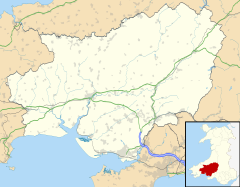Laugharne
Laugharne
|
|
|---|---|
 Laugharne seen from the castle |
|
| Laugharne shown within Carmarthenshire | |
| OS grid reference | SN301109 |
| Community | |
| Principal area | |
| Ceremonial county | |
| Country | Wales |
| Sovereign state | United Kingdom |
| Police | Dyfed-Powys |
| Fire | Mid and West Wales |
| Ambulance | Welsh |
| EU Parliament | Wales |
Laugharne /ˈlɑːrn/ (Welsh: Talacharn) is a town in Carmarthenshire, Wales, lying on the estuary of the River Tâf. It is known for having been the home of Dylan Thomas from 1949 until his death in 1953, and is thought to have been an inspiration for the fictional town of Llareggub in Under Milk Wood. The Township was originally known as Abercorran, but this was changed to Laugharne after the Civil War, in honour of Major-General Rowland Laugharne, a renowned local army officer, who had commanded a Parliamentarian army, before rebelling in 1648.
In the early 12th century, grants of lands were made to Flemings by Henry I when their country was flooded, and later they were joined by Flemish soldiers banished by Henry II. They were weavers and dyers and were such an influence that Welsh was hardly ever heard in Laugharne.
A castle, known originally as the Castle of Abercorran, existed in Laugharne before the Norman Conquest and belonged to the princes of South Wales. Henry II visited it in 1172 on his return from Ireland and made peace with Prince Rhys of Dinefwr. Through the marriage of Prince Rhys' daughter, the castle passed to Sir Guy de Brian, who had been Lord High Admiral of England. His daughter Elizabeth inherited the castle and married Owen Laugharne of St. Bride's who gave his name to the castle.
...
Wikipedia

